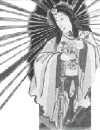![]() Shinto is an ancient very old tradition native to Japan. Although most modern
Japanese celebrate Shinto holidays, today about 4 million Japanese consider
themselves to be Shintoists.
Shinto is an ancient very old tradition native to Japan. Although most modern
Japanese celebrate Shinto holidays, today about 4 million Japanese consider
themselves to be Shintoists.
Origins of Shinto
Shinto is the oldest Japanese religion, dating back to the first millennium BCE. Until the sixth century CE, it existed as a mix of nature worship, fertility cults, divination techniques, hero worship, and shamanism. Unlike Buddhism, Christianity, or Islam, it had no founder and it did not develop sacred scriptures, an explicit religious philosophy, or a specific moral code. Indeed, the early Japanese had no single term by which they could refer to their religious philosophy. The word Shinto, or "the Way of the kami (spirits)," came into use only after the Japanese sought to distinguish their own tradition from the foreign religions of Buddhism and Confucianism.
Shinto Sacred Texts
Shinto has no sacred writings in the western sense. However, much can be
learned about Shinto's world view from Japanese mythology. Two eighth-century
works, the Kojiki (Record of Ancient Matters) and the Nihon shoki (Chronicles of
Japan), include the story of the creation of the Japanese islands by the divine
couple, Izanagi and his mate, Izanami; the subsequent birth of numerous gods and
goddesses, including the Sun Goddess, Amaterasu.
much can be
learned about Shinto's world view from Japanese mythology. Two eighth-century
works, the Kojiki (Record of Ancient Matters) and the Nihon shoki (Chronicles of
Japan), include the story of the creation of the Japanese islands by the divine
couple, Izanagi and his mate, Izanami; the subsequent birth of numerous gods and
goddesses, including the Sun Goddess, Amaterasu.
Shinto Beliefs
Shinto is without scriptures, dogmas, and creeds. Most prominent is a sense of gratitude and respect for life, a deep appreciation of the beauty and power of nature, a love of purity and cleanliness, and a preference for the simple and unadorned. The Shinto world view is fundamentally bright and optimistic, as befits a religion in which the main deity is a sun goddess.
In the Shinto view, the natural state of the cosmos is one of harmony in
which divine, natural, and human elements are all intimately related. Moreover,
human nature is seen as inherently good, and evil is thought to stem from one's
contact with external forces or agents that pollute our pure nature and cause us
to act in ways disruptive of the primordial harmony.
harmony in
which divine, natural, and human elements are all intimately related. Moreover,
human nature is seen as inherently good, and evil is thought to stem from one's
contact with external forces or agents that pollute our pure nature and cause us
to act in ways disruptive of the primordial harmony.
The kami are the objects of worship in Shinto. They are sacred spirits and can take various forms such as natural elements like the sun, mountains, trees, rocks, and the wind, or abstract things like fertility, but also ancestors, and national heroes. The word kami is frequently translated "god", but it expresses a concept very different from that found in Western religion. Shinto deities are not omnipotent. In the broadest sense, a kami may be anything that is extraordinary and that inspires awe or reverence. Worship in Shinto is undertaken to express gratitude to the gods and to secure their continued favor.